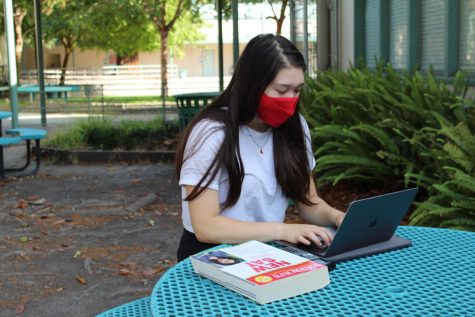Seniors go to great lengths to take standardized tests
September 30, 2020

One thousand seven hundred miles. That’s how far Palo Alto High School senior Avantika Singh was prepared to fly to take her October ACT, after her April ACT was canceled due to COVID-19 and the closest testing center available before December was in Austin, Texas.
Singh recently switched the location of her exam after a spot became available in Burlingame, also in October, but said she would have flown to Texas had nothing else opened up.
“I know that I want to ED [apply early decision] somewhere, so if I had taken it in December just in the nearby location, that wouldn’t have really helped me,” Singh said. “I don’t even know if it would have helped me for regular [decision] schools.”
Singh is one of many Paly seniors who are willing to travel far — or even out-of-state — to receive test scores before college applications are due, even with most colleges adopting “test-optional” policies for at least the upcoming admissions season due to the mass cancellations of the SAT and ACT.
According to a statement released by the College Board on Aug. 18, out of the 402,000 students who registered to take the Aug. 29 SAT and SAT Subject Tests, 178,000 were unable to test after 46% of testing centers scheduled to administer the exams closed.
Senior Zander Leong said he took his September SAT out-of-state, and had scheduled another test in November — also out-of-state — in case the September one was canceled. Leong said he plans to apply to a few international schools which are still reviewing their test policies, a factor he said contributed to his decision to sign up for multiple tests out-of-state with hopes that one of them would happen.
For some seniors, opting to travel long distances to take their standardized tests was not due to availability, but strategy. Senior Hannah Zhou, who had expected to take the SAT in May before the pandemic struck, said she had originally signed up to take the Sept. 25 SAT at Bellarmine College Preparatory but switched the location to Yreka Union High School, which is about six hours away, because she thought it was less likely to be canceled.
“My strategy was that I thought that generally, the Bay Area is more densely populated and we’re honestly kind of a hotspot for COVID-19 cases,” Zhou said. “I also saw that almost all the test centers near here were getting canceled on the SAT test center closings website, while some in further places in California were still open.”
Even so, Zhou said she was notified that her test had been canceled 11 days before the exam and signed up for the Sept. 25 SAT again, this time in Oregon. However, Zhou said she decided not to attend the exam and instead take advantage of the test-optional policy all of the schools on her list have adopted.
“I’m not super concerned because there are so many other parts of your application that can show your rigor or your academic ability,” Zhou said. “I don’t think the SAT will be the deciding factor.”
Singh said that although all of the schools she plans to apply to are test-optional, she believes not submitting a score could hurt her chances of being admitted.
“If one person has a very similar application to me, if someone submits a 36 on the ACT or something, that’s what’s going to differentiate us,” Singh said.
Paly College Advisor Sandra Cernobori said she does not recommend students who do not need to submit scores take standardized tests.
“If you’re not applying to a college that requires scores, I don’t think it’s worth taking the test at all,” Cernobori said. “At colleges that do holistic admissions, like private colleges and flagship publics like our UCs, the test score alone is not going to make or break an application. And now that it’s optional, it’s really not.”
Last-minute test cancellations have caused some students, including Leong, to spend months preparing for their exams only for the test to be canceled. Leong, whose May and June SATs were canceled, said he has been studying for his exam for over a year.
“I feel like they [the College Board] should have just canceled completely, instead of saying, ‘It might happen, it might not,’ because then you really don’t know what’s going on,” Leong said. “You just have to keep studying until you finally get a test.”
Senior Kimi Lillios expressed similar frustrations after her March SAT was canceled the day before it was supposed to take place. Lillios said she has since signed up for two more SATs: one in September, which has been canceled, and one in November.
“By the time I found out that my [March] test had been canceled, it was really disappointing because I had put all of this work in,” Lillios said. “I had already reached my peak. I had improved my score, so finding out I had to push it back to an unknown date was kind of frustrating.”
Cernobori said she recommends seniors focus on completing their college applications rather than spending time preparing for the SAT or ACT, which they would have normally done during the spring of their junior year.
“Finalize your college list and put your time and energy into your applications,” Cernobori said. “This is a lot of pressure to put on students, which is why the vast majority of colleges are saying please don’t worry about this. I think students need to trust that.”
With many Paly students signing up for multiple tests and traveling far to receive scores, Leong said he believes limited availability of the SAT and ACT will increase inequities caused by the standardized testing system.
“For those who have the means, it’s possible to travel somewhere else to take the test or sign up for multiple tests,” Leong said. “But for those who aren’t able to do so or don’t feel comfortable doing so, they’re at a disadvantage. Which only exaggerates inequity and exclusion in the already flawed testing system.”



Emma Donelly-Higgins • Sep 30, 2020 at 10:07 pm
The fact that students are now traveling during a PANDEMIC to take an unnecessary test only highlights the inequities in this school district.